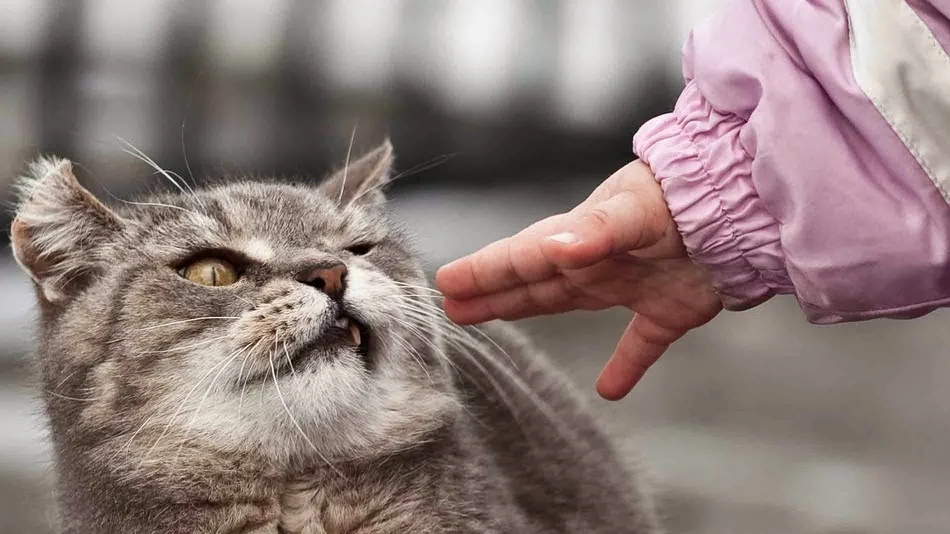Kittens can be injured by the loving attention of children, especially young ones.
And with over 600,000 cat bites reported every year in the United States, you can clearly see that some cats give as good as they get.
The key to keeping children and cats together safely is to make sure that their interactions are supervised and to teach children how to handle and respect cats.
And with over 600,000 cat bites reported every year in the United States, you can clearly see that some cats give as good as they get.
The key to keeping children and cats together safely is to make sure that their interactions are supervised and to teach children how to handle and respect cats.
Every home has various rules, and living with cats brings about its own sets of rules. Here is a basic list of things you should teach your kids not to do to help avoid cat behavior problems.
1. No pulling the cat’s tail. There is hardly a cat alive that allows its tail to be pulled on without retaliating.
2. No throwing toys at the cat. The cat will quickly come to dislike the person who is hurting him. If the child is throwing toys, someone will need to step in and distract the child.
Depending on the age of the child, she or he may or may not understand the concept of hurting and nice play. It doesn't hurt to try to explain it, but remember that kids will be kids.
3. If the cat is swishing his tail rapidly, has his ears back, or growls, it is time to leave him alone, no exceptions! Growling is an obvious indication of displeasure, but the ears back against the head and the rapidly swishing tail are also a cat’s way of communicating anger and fear.
4. No picking the cat up by the neck or back (scruff) of the neck.
Yes, mother cats do it, and if you know how to do this safely it is fine up until the cat reaches a certain age.
But picking a cat up by the scruff of the neck should only be done when absolutely necessary (like when the cat is being aggressive). Try not to do it in front of your child, and don’t let your child pick the cat up by the neck or collar – ever.
 |
| Click Here to read Interesting Facts About Cats |
It is very difficult to de-frighten a cat once it has been frightened by a child.
6. No holding the cat down. A cat that is being held tightly will respond with the only weapons he has — nails and teeth.
7. No cornering or trapping the cat. Same result as above...nails and teeth!
8. No bothering the cat while he is in the litter box. This is essential. If the cat becomes fearful of using the litter box, you will have a big problem on your hands.
9. No using strings to play with the cat. Cats can very easily swallow strings, leading to choking or intestinal blockage. Lots of cat toys come on the ends of strings (such as wand toys), and yarn is a classic, but an adult should always be present to oversee the play when a child is playing with toys attached to string.
10. No giving the cat a bath. Same result as number 6. This is definitely an adult (preferable multiple adults) only chore. Cats don't need baths, as they are cleaning themselves "all the time"! If your cat becomes soiled or smells, they have "handy-dandy" kitty wipes, which if done gently, your cat will enjoy.
Teach children to leave cats alone while they're eating, sleeping, chewing on toys ... Keep your little one safe by supervising interactions at all times.
Cats, basically are very easy to care for - feed them, clean their litter and interact with them by gently petting them, play with them (throwing small balls and cloth mouses) brushing them and respecting them...and they will reward you with a lifetime of cuddles and love.
"My cat runs after the ball and brings it back to me by dropping it by my feet...so funny...just like a dog."
Cats, basically are very easy to care for - feed them, clean their litter and interact with them by gently petting them, play with them (throwing small balls and cloth mouses) brushing them and respecting them...and they will reward you with a lifetime of cuddles and love.
"My cat runs after the ball and brings it back to me by dropping it by my feet...so funny...just like a dog."
Please...KEEP YOUR CAT INSIDE THE HOUSE! It's healthier and safer for them...your cat thanks you, and so do I!
Sources:





